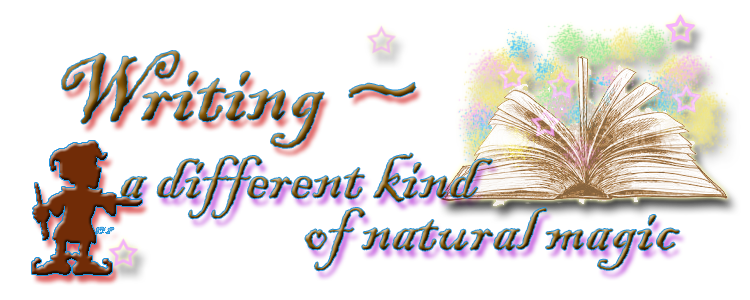|

I would like to see a revolution in the world of book writing, reading, and publishing.
I remember that, when I was a child, it was my habit to take a book up into a tree to do my reading. Sometimes the books got stained with food or dropped into the dirt or leaf stains. These days I love to sit by trees and neatly read or tidily write. When I was young, I drew pictures in the books, underlined some passages, made colored frames around paragraphs or even whole pages, wrote notes and small poems and made doodles in the margins. But...
Of course, this was all forbidden. You're not supposed to write in books, right? Only the author is allowed that privilege. And God/dess knows the author can't write just anything because the publisher and/or editor is going to re-work every word and idea to suit a pretty rigid set of rules of what a book should contain and how it should look. It should be tidy. It should have straight lines and sharp edges. The corners must be square. The ideas must be rather neatly square too. Linear — we must have linearity! Not many people can get something truly unconventional published — publishers don't like to take risks. Maximize the profit! It must follow the publisher's house style. Anything that doesn't have white pages and black print is terribly daring. The more pristine and untouched a first edition is, the more valuable it is generally believed to be eventually. Gods forbid that you should laugh so hard that you spill something on the pages! And, of course, the bigger the publisher, the more the whole thing is about money.
I got scolded in school, and learned not to damage books. Many years later, I was shocked to find out that there is a sort of art/craft thing about "modified books" where people intentionally desecrate books. They take a book and turn it into something else — a "work of art". They cut or tear or paint the pages; they glue things to the pages; they make it into something to be looked at instead of read. The original book may even be entirely obliterated. Some of them are fascinating and quite beautiful, in the same way that interesting, even beautiful things can be made from other found objects. But they aren't exactly books anymore. I'm not against this as long as the books truly had no value as books, but I am interested in another way of thinking about books.
What if one were enhancing and expanding the original book instead of obliterating it?
One of the most satisfying and delightful things I've experienced as an author has been discovering what some creative people do to their copies of The Faeries' Oracle — they write in them, they draw in them, they add objects — memorabilia — to them. These books aren't necessarily intended as art. They are livres de mémoire, memory books, and the living lore added with such élan enables the owners to creatively expand their understanding of what is already written — as well to remember their own experiences and ideas. But, do you know, I would certainly class them as living art.
I'll never forget a woman asking hesitantly if I'd mind signing her copy of the Oracle. It was, she explained with some embarrassment, very untidy. She pulled the carefully wrapped book out from a bag. It was tied up in a worn silk scarf, and she gently, almost reverently unwrapped it. It didn't look much like a copy of the Oracle any more. It was about three times as thick and had several ribbons and things tied around it to hold it together. The cover was seriously battered, the spine detached, the original pages rumpled but still readable, and it had many extra pages glued between the printed pages — some of them scribbled on scraps of paper, some fine calligraphy on fine handmade papers. All of the pages, original and added, had their blank spaces covered with notes and sketches and diagrams and cartoons. There were fragments of spells and rituals in the margins. Blobs of candle wax showed where the book and the fae had participated in candlelit revels. Preserved leaves and flowers, moss and bark, and even small stones were attached to the pages. There were scraps of lace, fabric, yarn, and ribbons glued in, including a fragment of lace from a wedding veil. There were innumerable handmade and lovely bookmarks scattered throughout, often with notes on them as well. It was a masterpiece of love and creativity and memories and inspirations and insights. It radiated boisterous faery merriment and mirth. I was quite literally enchanted by it. I couldn't put it down or stop asking her questions about the things in it. It was magical.
This all began a slow fermenting process in the back of my mind. Ever since, I've been thinking of books as potentially co-created works of art. What if...
I hope to write a book about the Green Woman. I want to do wild and astonishing things with it. I'd like it to be so the reader can hear several faery voices talking at once. The fae would like to be able to bounce out of the page and bop you on the nose or give you a sweet kiss. There should be hidden secrets to be found. Wisdom should peek around the corners and want to be chased. It has to be able to glitter and twinkle in appropriate moments. Can this be done? I don't know. One thing I do know though — it has to have space in it for you to add your own wisdom and encounters with her — and her friends.
Sometimes I go places to sign copies of my books. I sit at my table and try to say something a little special for each person and sign their books neatly. But what if... You can probably guess what I'm thinking here. From now on, I just may sometimes (when I have both time and energy) ask people if they would like the regular signature or a deluxe signature. The regular version is a few words and a signature, neatly entered into the proper page in the book. The deluxe version — what if I took special paper and ribbons and glitter and knackerty faery knotions and on the spot made a page for them to insert into the book? It would be interesting to see if anyone wanted it and if they would actually glue it into the book. I could bring the glue. I wonder if this might even encourage them to enhance the book with their own additions, creating their personal treasury of ideas and memories and experiences.
I'm realizing, just at this moment, that this is what I like about the social media like Facebook and blogs and web sites — I'm not just writing into a total vacuum in these places or for a publisher who thinks it is his job to pummel my vision into something he thinks he can best sell but who probably has no actual interest in it. Instead, here on-line, a few people even write back, and I'm tickled when they do even if I don't understand or like what they say. Sometimes it's clear that they didn't even really read what I said, but obviously they, too, are wanting to connect somehow, to be heard. What makes it really all worthwhile, though, is that quite often the responses are thoughtful, even delightful. Sometimes whole conversations involving several people get started. It's much more fun than writing into the void.
What if we became actively involved in our own entertainment and learning instead of passive receivers? What if we rediscovered and expanded our joy in our own creativity? How would you feel about that?
Here's a revolutionary thought: what if children made some of their own school books? What if the teacher wrote the basic facts on the board and the children copied them into a blank book and decorated (not necessarily "illustrated") the basic information with doodles or pictures or writing? And what if the teacher were wise enough to encourage the children to think/play/create for themselves, to write or draw what each child wanted to instead of going through the motions of meekly following the instructions of the teacher? What amazing concepts might the teacher learn about teaching and living from the children's unique and creative responses? What might the teacher learn about teaching? What startling and original discoveries might the children make about their lessons and themselves? I can tell you one thing: many grandparents would treasure these created books!
What if publishers included random blank pages and wide margins in books just so we'd have room to expand and add to the book's value for us? I know it might be extremely difficult to persuade them to do this. Horrors! It would increase costs! Horrors! It would spoil the very neat and tidy design of the pages and the rigid order of the edges and fonts if people wrote in them. It would encourage people to believe that the author of the book might not be the ultimate authority (approved by the publisher) to whom all the rest of us must mutely bow down.
I included a blank card in The Faeries' Oracle for people to draw their own faery friend on, and the editor was appalled. "People won't want to spoil the deck with drawings that are inferior to Brian's!" Well, you know, some people do feel like that about it. There was quite a battle. This tells me two terrible things about how we think about books. One is that our whole way of thinking about books is rigid, moribund, and doomed. The other is that we have a seriously wounded idea of the value of our own creativity. I would like to see a radical revolution in the world of book writing, reading, and publishing. I know I said that above, but it's worth repeating.
I have this fascination with blank books — the ones you buy to keep a journal or write your dreams or sketch in. I occasionally buy beautiful blank books. They terrify me! What if I spoil them by making a mess in them? They might stay blank forever because I'm not good enough to write or do something worthy of them. But what if I simply deliberately "make a mess" on the first page, ruining the book right off — and then I can do anything in them? Who knows how it might turn out? Or better yet, what if I get my young granddaughter to draw a picture on the first page? After that I could do no wrong... and I would be stepping into natural magic of creation.
Do you see what is happening here? Not only am I preaching to the choir, the many of you who have already sung your books, your writing, and your thinking free, but equally I'm speaking to the pulpit — myself. And I'm doing it because I, too, am stuck in an old dogma about learning and books and thinking and creativity from which I want to set myself free. Would you like to join the revolution? It would give faery yet another way to krow in your life.
O! I just realized something! What about doing the drawings, adding the glitter and ribbons and other things into a book that I'm writing? What if I made the original manuscript (not the one I send the publisher!) full of fizz and joy? How much might that might add magic to the writing process?

Copyright ©2013 and ©2019 by Jessica Macbeth. All rights reserved.

Back to Words
What's New?

Beannachd!
Jessica Macbeth
|

